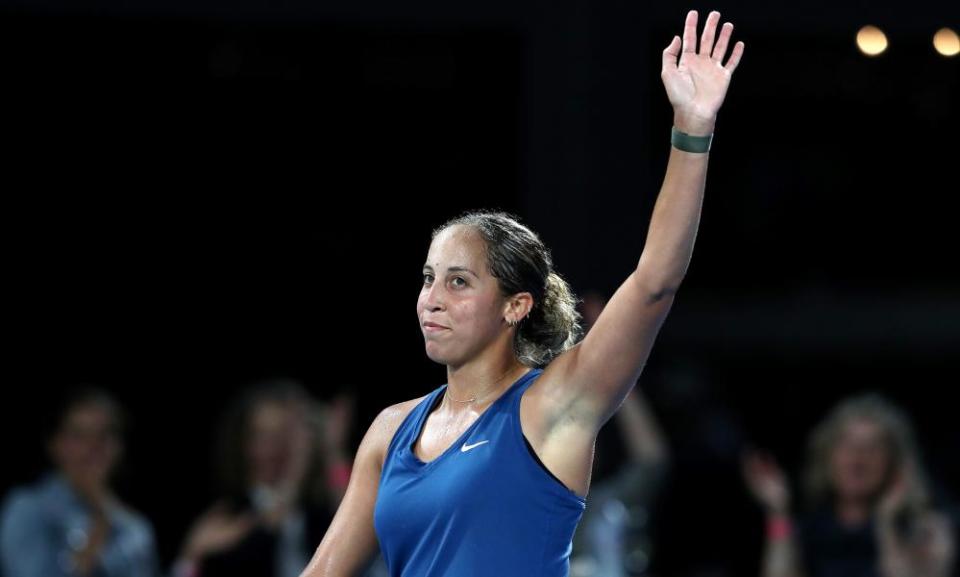Madison Keys rediscovers her joy to burst into Australian Open contention

As Madison Keys and Paula Badosa took to Rod Laver Arena on Sunday morning in Melbourne, their fourth-round match played out to the sound of frequent gasps from the crowd. With Keys, one of the biggest ball-strikers in recent memory, such noises can often be reactions to the size of her misses as well as the spectacle of her shotmaking. There is rarely a middle ground.
In this case, Keys spent 69 minutes destroying every ball in sight, and her top 10 opponent in the process, beating the eighth seed 6-3, 6-1 to reach the quarter-final of the Australian Open.
Related: Australian Open day seven: Barty beats Anisimova, Carreno Busta v Berrettini – live!
It would usually be no surprise to see Keys produce such a performance on the big stage. She has been ranked in the top 10 in four seasons, reached four major semi-finals and contested the US Open final in 2017. But Keys had started the 2022 season at the nadir of her career after struggling through the pandemic. Having failed to regain her form as the tour restarted in 2020, Keys’ morale was further damaged after testing positive for Covid-19 just before she was due to fly to the 2021 Australian Open.
Then came the bubbles. Tennis players were mostly restricted to their hotel rooms and the tennis courts during tournaments last year. For Keys, such an arrangement meant her thoughts were often only about tennis – and she began to overthink. Her on-court issues soon bled into her personal life. “I was just at a very high anxiety level all of the time,” she said. “I wasn’t sleeping as well. It felt like there was literally a weight on my chest. I became so focused and obsessed with [tennis] that I wasn’t enjoying, really, anything because it’s all I was thinking about.”
Those struggles were seen in her performances on the court. Keys ended 2021 with a record of 11-15, losing seven of her last eight matches of the season. After spending the previous five years in and around the top 10, Keys dropped outside of the top 50. Two weeks ago, she fell to 87th, her lowest ranking since she was 17.

Keys says she eventually resolved to relish her time on the court. “My biggest mindset change is just trying to enjoy tennis, take some of that just internal pressure that I was putting on myself,” she said. “It was honestly freezing me. I felt like I couldn’t play at all. Just taking that away and putting tennis into perspective: that it’s a sport, something that when I was little I enjoyed doing and loved doing it. I was letting it become this dark cloud over me.”
Keys started the season with another first-round loss but unexpectedly won the final pre-Australian Open tournament in Adelaide, defeating two top-20 players, Elina Svitolina and Coco Gauff, en route. And that was it. Her confidence renewed, she beat Sofia Kenin, the 2020 Australian Open champion, in the first round here and has continued rolling into the quarter-final. Her rapid momentum is a reminder of how quickly fortunes can change in tennis.
Keys stepped onto Rod Laver Arena at 11am on Sunday and what followed was an utter demolition. She was on top of most points from the beginning, serving well, eviscerating returns and striking winners from all parts of the court. By the beginning of the second set, Keys had struck an incredible seven return winners, as many winners as Badosa had managed overall.
Related: Alex de Minaur is not just the antidote to Nick Kyrgios at Australian Open
One of the most in-form players on the tour, Badosa could only shake her head afterwards. “What can I say?” she said. “Sometimes I was serving 180kmh. I had to look what the serve said because I didn’t understand how a winner came back that fast. I thought I was serving bad. Then I saw it was her game, that she was playing very, very good.”
Badosa noted that Keys had a day where all of her shots landed in, an fair observation of her high-risk game. Keys has the weapons to tear apart all her potential opponents but she can equally be her own worst enemy. But however her excellent comeback tournament pans out, it is far more important that she simply continues to take joy and satisfaction in her efforts on and off the court.

 Yahoo News
Yahoo News 
